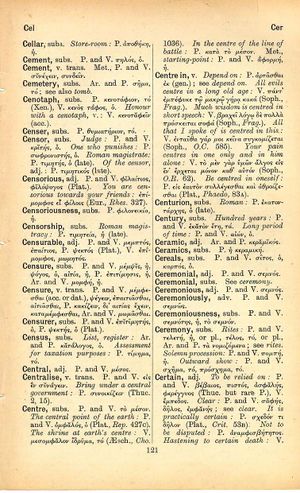census
English > Greek (Woodhouse)
subs.
List, register: Ar. and P. κατάλογος, ὁ.
Assessment for taxation purposes: P. τίμημα, τό.
Latin > English (Lewis & Short)
census: a, um, Part., from 1. censeo.
census: ūs, m. 1. censeo.
I A registering and rating of Roman citizens, property, etc., a census; cf. Liv. 1, 42, 5; Dig. 50, 15, and the compendiums referred to under censor: habere, Cic. Verr. 2, 2, 53, § 131: agere, Liv. 3, 22, 1; 40, 46, 8; Suet. Aug. 27; id. Tib. 21: facere, Gell. 10, 28, 1: censere, cf. censeo: censu prohibere, to refuse one admittance into the lists of citizens, Cic. Sest. 47, 101; so, censu excludere, Liv. 45, 15, 4: manumissio censu, i. e. when a slave was enrolled in the census at the request of his master, Just. Inst. 1, 5, 1.— Hence,
II Meton.
A The register of the census, the censor's lists, P. Afr. ap. Gell. 7, 11, 9; Cic. Balb. 2, 5; id. Arch. 5, 11; id. Cael. 32, 78; Liv. 39, 44, 2; Dig. 50, 15, 4; 22, 3, 10.—
B The registered property of Roman citizens: census senatorum (800,000 sesterces), Suet. Aug. 41; id. Vesp. 17: census equester (400,000 sesterces), id. Caes. 33; id. Aug. 40; cf. Juv. 14, 326.—
C Wealth, riches, property, possessions, in gen. ( = divitiae, opes): homo egens, sine censu, Cic. Fl. 22, 52; so Hor. C. 2, 15, 13; id. S. 2, 3, 324; Ov. F. 1, 217; id. M. 3, 588; 8, 846; Plin. 14, prooem. § 5; Tac. A. 2, 37; Suet. Ner. 38; 44 al.: exiguus, Hor. Ep. 1, 1, 43: tenuis, id. ib. 1, 7, 56: opimo onerare digitos, Plin. 33, 1, 6, § 22.—Poet., = pretium, munera, rich presents, gifts, Ov. M. 7, 739.—
2 Trop.: censu Tullius oris (by eloquence) Emeritus caelum, Manil. 1, 792; cf. id. 1, 12; 3, 71.
Latin > French (Gaffiot 2016)
(1) cēnsus, a, um, part. de censeo.
(2) cēnsŭs,⁹ ūs, m.,
1 cens, recensement (quinquennal des citoyens, des fortunes, qui permet de déterminer les classes, les centuries, l’impôt) : censum habere Cic. Verr. 2, 2, 63 ; agere Liv. 29, 15, 9, faire le recensement ; censu prohibere Cic. Sest. 101 ; excludere Liv. 45, 15, 4, ne pas admettre qqn sur la liste des citoyens

